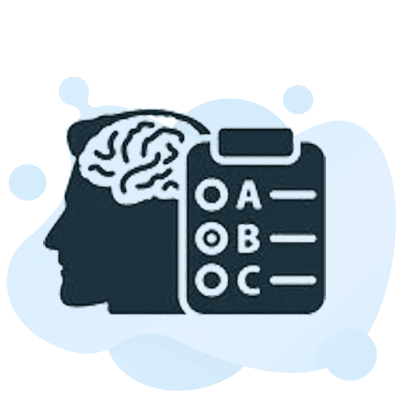GCAT (General Cognitive Ability Test) | Top Prep Course

The GCAT (General Cognitive Ability Test) looks at how well you can reason, solve problems, and think analytically. It’s used a lot when companies test if you’re a good fit for jobs. Your performance on this test helps them see if you can handle tough decisions at work.
Free GCAT Practice Test Online
Many fields, like finance, engineering, and the armed forces, use the GCAT. They want employees who can figure things out easily. This makes the test an important step in hiring for many jobs.
Key Takeaways
- The GCAT (General Cognitive Ability Test) is a widely used pre-employment assessment that evaluates an individual’s overall cognitive abilities.
- Employers use the GCAT to identify candidates with the cognitive potential to excel in complex, decision-making roles across various industries.
- The GCAT covers a range of cognitive domains, including verbal reasoning, numerical reasoning, abstract reasoning, and spatial awareness.
- Cognitive ability tests are valid predictors of job success, assessing problem-solving and processing speed abilities.
- Preparing for the GCAT through practice tests, study guides, and timed simulations can help candidates demonstrate their cognitive strengths and increase their chances of success in the hiring process.
Understanding the GCAT (General Cognitive Ability Test)
Cognitive ability tests were first made in the late 19th century. They measure a person’s overall mental ability. The GCAT isn’t like tests for specific skills. It looks at different thinking areas like verbal reasoning, numbers, and spatial awareness. These tests see if someone can problem-solve, think logically, and learn new things fast. Employers use the GCAT to guess how well someone might do in a job needing smart decisions, quick thinking, and lots of tasks.
What is a Cognitive Ability Test?
GCATs have various question types to check different thinking skills. For numbers, there are math problems and financial work. Verbal questions look at reading and understanding. Then there are logic puzzles to test problem-solving and reasoning. The test also asks about mechanical and electrical knowledge. Plus, it checks if you can understand shapes and images. Questions are timed to test how you handle pressure while being accurate.
Types of Questions on the GCAT
GCAT questions aim to measure skills that show if you might do well at work. Like, how you spot patterns in ideas or understand written info. Plus, there are numbers and logic questions to test your problem-solving and thinking styles. Employers get a full picture of how well someone might learn, adjust, and do good in complex jobs.
Reasoning Skills Assessed by the GCAT
The GCAT looks at many thinking abilities important for jobs. It sees if you can solve problems, reason well, and have high potential. Employers use this to find folks who could do great in jobs needing quick decisions and various tasks. By checking a person’s strengths and weaknesses in thinking, the GCAT helps employers see if someone can succeed and grow in their company.

GCAT (General Cognitive Ability Test) Prep and Practice
To get ready for the GCAT, you can use a lot of different free cognitive ability practice tests and tools. This includes sample questions, online practice tests, and full exams that look just like the real thing. Using these free tests helps you get used to the format, the questions, and the time limits. You can find out what you’re good at and what you need to work on. Doing this makes it easier to perform well on the actual test.
Comprehensive GCAT Study Guides
There are also many free study guides available for the GCAT. These guides offer a deep dive into the test’s structure, the kinds of questions you’ll face, and the skills it measures. They include practice questions for different subjects and explain how to answer them. By going through these guides, you can understand the test better. Plus, you can prepare strategies to improve your scores in areas like understanding texts, working with numbers, and thinking logically.
These guides don’t stop there. They also give valuable tips on how to approach the test. You’ll learn how to stay calm and use your time wisely. With the right strategies and knowledge, you can face the GCAT with confidence.
Timed Test Simulations
To handle the pressure of the GCAT’s time limits, doing timed practice tests is key. These tests push you to answer questions as fast as you can, just like the real GCAT does. By doing timed simulations, you can learn how to pace yourself and handle the stress. This kind of practice guarantees you’re ready to do your best on test day.
Conclusion
The GCAT (General Cognitive Ability Test) is an important pre-employment assessment. It looks at a person’s cognitive abilities. This includes how they think, solve problems, and analyze information.
Employers from many fields use the GCAT. They want to find people with sharp minds ready for challenging jobs. To do well, candidates should practice with free tests and study a lot. By getting ready, you show employers what you’re capable of. You’ll have a better shot at the job.
Good scores on the GCAT can lead to better jobs. These jobs need smart people who can solve problems and think critically.
